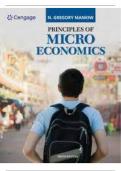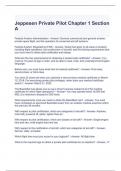,Instructor Solution Manual For
Principles of Macroeconomics, 9th Edition N. Gregory Mankiw Ronald D. Kneebone
Kenneth J McKenzie
Chapter 1-18
Chapter 1
Ten Principles of Economics
SOLUTIONS TO TEXTBOOK PROBLEMS
Questions for Review
1. What is a tradeoff? Give two examples of tradeoffs that you face in your life.
A tradeoff is what you give up in order to get something else. Examples of tradeoffs include time
tradeoffs (such as studying one subject over another, or studying at all compared to engaging in
social activities), and spending tradeoffs (such as whether to use your last $15 to purchase a
pizza or to buy an online study guide for that tough economics course).
2. What is the opportunity cost of seeing a movie?
The opportunity cost of seeing a movie includes the monetary cost of admission plus the time
cost of going to the theatre and attending the show. The time cost depends on what else you
might do with that time; if it’s staying home and watching TV, the time cost may be small, but if
it’s working an extra three hours at your job, the time cost is the money you could have earned.
3. Water is necessary for life. Is the marginal benefit of a glass of water large or small?
The marginal benefit of a glass of water depends on your circumstances. If you’ve just run a
marathon, or you’ve been walking in the desert sun for three hours, the marginal benefit is very
high. But if you’ve been drinking a lot of liquids recently, the marginal benefit is quite low. The
point is that even the necessities of life, like water, don’t always have large marginal benefits.
4. Why should policymakers think about incentives?
Policymakers need to think about incentives so they can understand how people will respond to
the policies they put in place. The text’s examples of seat belts and crosswalk countdown signals
show that policy actions can have quite unintended consequences. If incentives matter a lot, they
may lead to a very different type of policy; for example, some economists have suggested
putting knives in steering columns so that people will drive much more carefully! While this
suggestion is silly, it highlights the importance of incentives.
5. Why isn’t trade among countries like a game, with some winners and some losers?
Trade among countries isn’t a game with some losers and some winners because trade can make
everyone better off. By allowing specialization, trade between people and trade between
countries can improve everyone’s welfare.
Copyright © 2024 Cengage Learning Canada, Inc.
,6. What does the ―invisible hand‖ of the marketplace do?
The ―invisible hand‖ of the marketplace represents the idea that even though individuals and
firms are all acting in their own self-interest, prices and the marketplace guide them to do what is
good for society as a whole.
7. Explain the two main causes of market failure and give an example of each.
The two main causes of market failure are externalities and market power. An externality is the
impact of one person’s actions on the well-being of a bystander, such as from pollution or the
creation of knowledge. Market power refers to the ability of a single person (or small group of
people) to unduly influence market prices, such as in a town with only one well or only one cable
television company.
8. Why is productivity important?
Productivity is important because a country’s standard of living depends on its ability to produce
goods and services. The greater a country’s productivity (the amount of goods and services
produced from each hour of a worker’s time), the greater will be its standard of living.
9. What is inflation, and what causes it?
Inflation is an increase in the overall level of prices in the economy. Inflation is caused by
increases in the quantity of a nation’s money.
10. How are inflation and unemployment related in the short run?
Inflation and unemployment are negatively related in the short run. Reducing inflation entails
costs to society in the form of higher unemployment in the short run.
Problems and Applications
1. Describe some of the tradeoffs faced by each of the following.
a. a family deciding whether to buy a new car
b. a member of Parliament deciding how much to spend on national parks
c. a company president deciding whether to open a new factory
d. a professor deciding how much to prepare for class
a. A family deciding whether to buy a new car faces a tradeoff between the cost of the car
and other things they might want to buy. For example, buying the car might mean they
must give up going on vacation for the next two years. So the real cost of the car is the
family’s opportunity cost in terms of what they must give up.
b. For a member of Parliament deciding whether to increase spending on national parks,
the tradeoff is between parks and other spending items or tax cuts. If more money goes
into the park system, that may mean less spending on national defence or on the police
force. Or, instead of spending more money on the park system, taxes could be reduced.
c. When a company president decides whether to open a new factory, the decision is based
on whether the new factory will increase the firm’s profits compared to other
alternatives. For example, the company could upgrade existing equipment or expand
existing factories. The bottom line is: Which method of expanding production will
Copyright © 2024 Cengage Learning Canada, Inc.
, increase profit the most?
d. In deciding how much to prepare for class, a professor faces a tradeoff between the
value of improving the quality of the lecture compared to other things she could do with
her time, such as working on additional research.
2. You are trying to decide whether to take a vacation. Most of the costs of the vacation (airfare,
hotel, forgone wages) are measured in dollars, but the benefits of the vacation are psychological.
How can you compare the benefits to the costs?
When the benefits of something are psychological, such as going on a vacation, it isn’t easy to
compare benefits to costs to determine if it’s worth doing. But there are two ways to think about
the benefits. One is to compare the vacation with what you would do in its place. If you didn’t go
on vacation, would you buy something like a new set of golf clubs? Then you can decide if you’d
rather have the new clubs or the vacation. A second way is to think about how much work you
had to do to earn the money to pay for the vacation; then you can decide if the psychological
benefits of the vacation are worth the psychological costs incurred to earn the money to pay for
the vacation.
3. You were planning to spend Saturday working at your part-time job, but a friend asks you to go
skiing. What is the true cost of going skiing? Now suppose that you had been planning to spend
the day studying at the library. What is the cost of going skiing in this case? Explain.
If you are thinking of going skiing instead of working at your part-time job, the cost of skiing
includes its monetary and time costs, including the opportunity cost of the wages you are giving
up by not working. If the choice is between skiing and going to the library to study, then the cost
of skiing is its monetary and time costs, including the cost to you of getting a lower grade in your
course.
4. You win $100 in a hockey pool. You have a choice between spending the money now or putting
it away for a year in a bank account that pays 5 percent interest. What is the opportunity cost of
spending the $100 now?
If you spend $100 now instead of saving it for a year and earning 5 percent interest, you are
giving up the opportunity to spend $105 a year from now. The idea that money has a time value
is the basis for the field of finance, the subfield of economics that has to do with prices of
financial instruments like stocks and bonds.
5. The company that you manage has invested $5 million in developing a new product, but the
development is not quite finished. At a recent meeting, your salespeople report that the
introduction of competing products has reduced the expected sales of your new product to
$3 million. If it would cost $1 million to finish development and make the product, should you go
ahead and do so? What is the most that you should pay to complete development?
The fact that you’ve already sunk $5 million isn’t relevant to your decision anymore, since that
money is gone. What matters now is the chance to earn profits at the margin. If you spend
another $1 million and can generate sales of $3 million, you’ll earn $2 million in marginal profit,
so you should do so. You’re right to think that the project has lost a total of $3 million ($6 million
in costs and only $3 million in revenue), and you shouldn’t have started it. That’s true, but if you
don’t spend the additional $1 million, you won’t have any sales and your losses will be $5 million.
So what matters is not the total profit, but the profit you can earn at the margin. In fact, you’d
pay up to $3 million to complete development; any more than that and you won’t be increasing
profit at the margin.
Copyright © 2024 Cengage Learning Canada, Inc.





